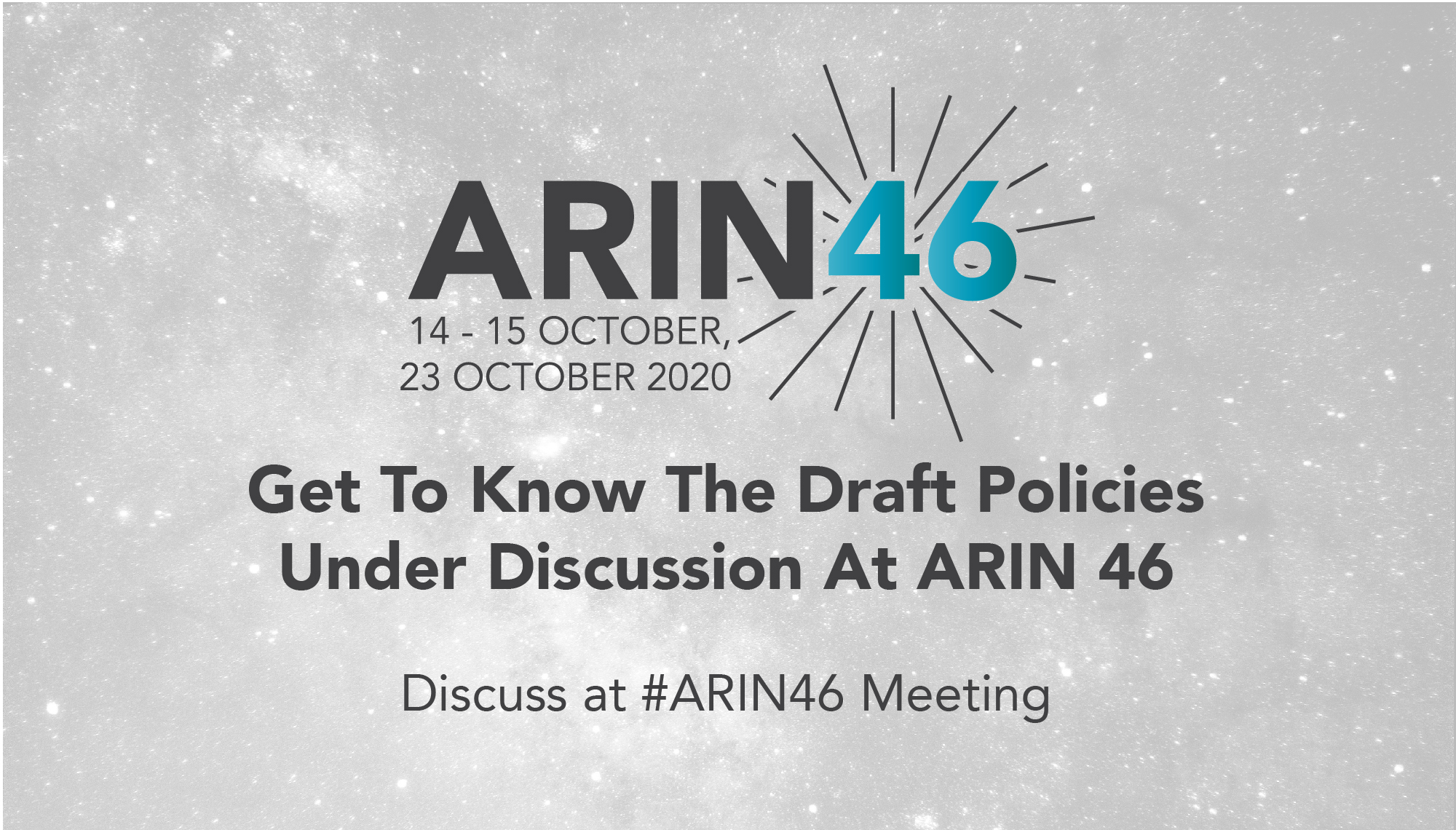
Get to Know the Draft Policies Under Discussion At ARIN 46
ARIN 46 is almost here! Have you booked your digital travel plans?
We are excited to bring our community together and remotely facilitate one of ARIN’s prime directives: the development of policy by the community for the management of IP addresses and Autonomous System Numbers. Our biannual Public Policy and Members Meetings are the cornerstone of our Policy Development Process (PDP), and they rely upon you, the community, to be successful.
To help newcomers and seasoned veterans alike, below is a look at the Draft Policies and Recommended Draft Policies up for discussion. I have provided a simple explanation of each policy to help you determine those of greatest interest to your organization and where you might want to spend more time catching up on prior discussions.
Note that Recommended Draft Policies are being recommended for adoption, and this may be the last time they are available for community discussion at an ARIN meeting.
For future reference, you can always find the current text of all Draft Policies, and Proposals at our newly renovated policy segment of the ARIN website:
Recommended Draft Policies
ARIN-2020-1: Clarify Holding Period for Resources Received via 4.1.8 Waitlist
This Recommended Draft Policy would allow organizations who have received space from the waitlist to transfer that space via M&A transfer without the standard waiting period of 60 months. Other transfers would still not be allowed until after that period.
ARIN-2020-2: Reinstatement of Organizations Removed from Waitlist by Implementation of ARIN-2019-16
This Recommended Draft Policy would restore organizations to the waitlist that were removed via ARIN-2019-16’s adoption if their total IPv4 holdings amount to a /18 or less, allowing them to extend their two-year approval and qualify for up to a /22, unless they have since had requests met via the transfer market, or any that do after ARIN 2020-2 is implemented.
ARIN-2020-3: IPv6 Nano-Allocations
This Recommended Draft Policy would reserve /36 IPv6 allocations to those who request them specifically, and /40 IPv6 allocations to those who meet specific requirements based on their IPv4 holdings. This would likely remove a current potential disincentive to IPv6 adoption for ISPs holding a /24 or smaller of IPv4 who might see substantial fee increases if allocated a /36 of IPv6.
ARIN-2020-5: Clarify and Update Requirements for Allocations to Downstream Customers
This Recommended Draft Policy would align requirements for downstream customers with existing ARIN End user policy and remove outdated RFC2050 references, which have been a source of confusion in the past.
Draft Policies
This Draft Policy would allow organizations, to request a smaller IPv4 block to renumber into prior to conducting a specified transfer under NRPM 8.3. or 8.4, and prevent organizations from creating new Org IDs just to receive a smaller block so that the larger block may be transferred.
ARIN-2020-7: 4.4 gTLD Micro-allocation Clarification
This Draft Policy would update the language surrounding “new gTLD” in NRPM Section 4.4, as it referred to all gTLD’s that have been created since June of 2012.
ARIN-2020-8: Clarify and Update 4.2.1.2 Annual Renewal Fee
This Draft Policy would update language regarding Annual Renewal, removing fee-specific language from the NRPM.
Participate in Policy Discussions
ARIN is committed to providing an open community forum for policy development, and that includes lowering barriers of entry of all kinds. New faces and widespread participation are key components in any Regional Internet Registry community, and ARIN is no exception. I hope the information in this post arms even the greenest ARIN participant with the tools they need to participate actively once the microphones turn on.
To submit your very own Internet number resource policy proposal, just fill out our brief template and send it to policy@arin.net. Don’t worry about getting the wording of your proposal exactly right – our Advisory Council will work with you directly to help transform your idea into a clear change, removal, or addition to policy text, and get it the community attention it needs to move through the PDP.
Attend Our PDP Webinar!
If you’d like a deep dive into ARIN’s Policy Development Process, register for the on-demand PDP webinar! Whether you are a newbie or a veteran looking to refine your skills, we invite you to join us for this tutorial of ARIN’s Policy Development Process.
Topics include:
- What Internet number resource policies mean to ARIN and to you
- How these policies are developed by the ARIN community
- Who participates in the PDP
- When key PDP steps occur
- Why you should get involved
Additional resources can be found on the following webpages:
We look forward to seeing you at ARIN 46!
Recent blogs categorized under: Public Policy
GET THE LATEST!
Sign up to receive the latest news about ARIN and the most pressing issues facing the Internet community.
SIGN ME UP →Blog Categories
ARIN Bits • Tips • Updates • Elections • Caribbean • Outreach • Security • RPKI • Public Policy • Guest Post • Grant Program • Fellowship Program • Data Accuracy • IPv6 • Business Case for IPv6 • Internet Governance • Training • IPv4 • Customer Feedback • IRR


